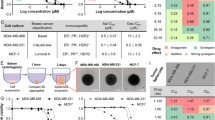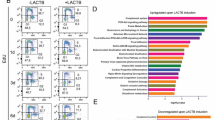Abstract
Background
Riproximin, a type II ribosome-inactivating protein (RIP), has shown significant cytotoxic effects in diverse types of cancer cells. To better understand its therapeutic potential, elaborated investigations on the mechanistic aspects of riproximin deem crucial. In this study, we focused on riproximin-mediated changes in cellular properties and corresponding molecular pathways in breast cancer cells.
Methods
Cytotoxicity of riproximin was determined by MTT assay, while the clonogenic and migratory effects were determined by colony formation, migration, and scratch assays. Cytostatic and apoptotic effects were studied by flow cytometry and nuclear staining procedures. Alterations at molecular levels were scrutinized by means of microarray and qRT-PCR methodologies.
Results
Riproximin induced significant cytotoxic effects in the selected human breast cancer cells MDA-MB-231 and MCF-7. Profound inhibition of migration and colony formation were observed in both cell lines in response to riproximin exposure. Concomitantly, a significant arrest in S phase and nuclear fragmentation were observed as causes for its cytostatic and apoptotic effects, respectively. Genetic profiling revealed pronounced induction of the anticancer cytokine IL24/MDA-7 and ER-stress-related GADD genes. In addition, prominent inhibition of the genes relevant to migration (RHO GTPases), anti-apoptotic activities (BCL family), and cell cycle (cyclins) was also noticed.
Conclusion
Riproximin, with its significant antineoplastic effects, modulates multiple cytostatic and apoptotic pathways in breast cancer cells. Results from these investigations highlight the future therapeutic potential of this naturally occurring compound for breast cancer.









Similar content being viewed by others
References
Adwan H, Bayer H, Pervaiz A, Sagini M, Berger MR (2014a) Riproximin is a recently discovered type II ribosome inactivating protein with potential for treating cancer. Biotechnol Adv 32(6):1077–1090. doi:10.1016/j.biotechadv.2014.03.008
Adwan H, Murtaja A, Kadhim Al-Taee K, Pervaiz A, Hielscher T, Berger MR (2014b) Riproximin’s activity depends on gene expression and sensitizes PDAC cells to TRAIL. Cancer Biol Ther 15(9):1185–1197. doi:10.4161/cbt.29503
Ahn SG et al (2013) Prognostic factors for patients with bone-only metastasis in breast cancer. Yonsei Med J 54(5):1168–1177. doi:10.3349/ymj.2013.54.5.1168
Bagga S, Seth D, Batra JK (2003) The cytotoxic activity of ribosome-inactivating protein saporin-6 is attributed to its rRNA N-glycosidase and internucleosomal DNA fragmentation activities. J Biol Chem 278(7):4813–4820. doi:10.1074/jbc.M207389200
Bayer H et al (2012a) Evaluation of riproximin binding properties reveals a novel mechanism for cellular targeting. J Biol Chem 287(43):35873–35886. doi:10.1074/jbc.M112.368548
Bayer H, Ey N, Wattenberg A, Voss C, Berger MR (2012b) Purification and characterization of riproximin from Ximenia americana fruit kernels. Protein Expr Purif 82(1):97–105. doi:10.1016/j.pep.2011.11.018
Bhutia SK et al (2013) Targeting breast cancer-initiating/stem cells with melanoma differentiation-associated gene-7/interleukin-24. Int J Cancer 133(11):2726–2736. doi:10.1002/ijc.28289
Brooks SC, Locke ER, Soule HD (1973) Estrogen receptor in a human cell line (MCF-7) from breast carcinoma. J Biol Chem 248(17):6251–6253
Cailleau R, Young R, Olive M, Reeves WJ Jr (1974) Breast tumor cell lines from pleural effusions. J Natl Cancer Inst 53(3):661–674
Coleman RE (2006) Clinical features of metastatic bone disease and risk of skeletal morbidity. Clin Cancer Res 12(20):6243s–6249s. doi:10.1158/1078-0432.Ccr-06-0931
Cretu A, Sha X, Tront J, Hoffman B, Liebermann DA (2009) Stress sensor Gadd45 genes as therapeutic targets in cancer. Cancer Ther 7(A):268–276
Daniels-Wells TR et al (2013) Insights into the mechanism of cell death induced by saporin delivered into cancer cells by an antibody fusion protein targeting the transferrin receptor 1. Toxicol In Vitro 27(1):220–231. doi:10.1016/j.tiv.2012.10.006
Dash R et al (2014) Novel mechanism of MDA-7/IL-24 cancer-specific apoptosis through SARI induction. Cancer Res 74(2):563–574. doi:10.1158/0008-5472.Can-13-1062
de Virgilio M, Lombardi A, Caliandro R, Fabbrini MS (2010) Ribosome-inactivating proteins: from plant defense to tumor attack. Toxins 2(11):2699–2737. doi:10.3390/toxins2112699
Fan X, He L, Meng Y, Li G, Li L, Meng Y (2015) Alpha-MMC and MAP30, two ribosome-inactivating proteins extracted from Momordica charantia, induce cell cycle arrest and apoptosis in A549 human lung carcinoma cells. Mol Med Rep 11(5):3553–3558. doi:10.3892/mmr.2015.3176
Fang EF et al (2012a) Trichosanthin inhibits breast cancer cell proliferation in both cell lines and nude mice by promotion of apoptosis. PLoS One 7(9):e41592. doi:10.1371/journal.pone.0041592
Fang EF et al (2012b) Momordica charantia lectin, a type II ribosome inactivating protein, exhibits antitumor activity toward human nasopharyngeal carcinoma cells in vitro and in vivo. Cancer Prev Res 5(1):109–121. doi:10.1158/1940-6207.Capr-11-0203
Feyssa DH, Njoka JT, Asfaw Z, Nyangito MM (2012) Uses and management of Ximenia americana, olacaceae in semi-arid east Shewa, Ethiopia. Pak J Bot 44(4):1177–1184
Fong WP, Mock WY, Ng TB (2000) Intrinsic ribonuclease activities in ribonuclease and ribosome-inactivating proteins from the seeds of bitter gourd. Int J Biochem Cell Biol 32(5):571–577
Gasperi-Campani A, Zoli W, Volpi A, Roncuzzi L, Amadori D (1991) Inhibition of growth of breast cancer cells in vitro by the ribosome-inactivating protein saporin 6. Anticancer Res 11(2):1007–1011
Hartley MR, Lord JM (2004) Cytotoxic ribosome-inactivating lectins from plants. Biochim Biophys Acta 1701(1–2):1–14. doi:10.1016/j.bbapap.2004.06.004
Horrix C, Raviv Z, Flescher E, Voss C, Berger MR (2011) Plant ribosome-inactivating proteins type II induce the unfolded protein response in human cancer cells. Cell Mol Life Sci 68(7):1269–1281. doi:10.1007/s00018-010-0524-2
Huang J et al (2009) [The effect of Rac1 siRNA on the biological behaviors of gastrointestinal cancer cells]. Sichuan da xue xue bao Yi xue ban = Journal of Sichuan University Medical science edition 40(4):588–592
Kantarjian HM, Talpaz M, Santini V, Murgo A, Cheson B, O’Brien SM (2001) Homoharringtonine: history, current research, and future direction. Cancer 92(6):1591–1605
Kienle GS, Glockmann A, Schink M, Kiene H (2009) Viscum album L. extracts in breast and gynaecological cancers: a systematic review of clinical and preclinical research. J Exp Clin Cancer Res CR 28:79. doi:10.1186/1756-9966-28-79
Lebedeva IV et al (2007) mda-7/IL-24, novel anticancer cytokine: focus on bystander antitumor, radiosensitization and antiangiogenic properties and overview of the phase I clinical experience (Review). Int J Oncol 31(5):985–1007
Li CJ, Tsang SF, Tsai CH, Tsai HY, Chyuan JH, Hsu HY (2012) Momordica charantia extract induces apoptosis in human cancer cells through caspase- and mitochondria-dependent pathways. Evid Based Complement Alternat Med 2012:261971. doi:10.1155/2012/261971
Li YJ et al (2013) mda-7/IL-24 expression inhibits breast cancer through upregulation of growth arrest-specific Gene 3 (gas3) and disruption of beta 1 Integrin function. Mol Cancer Res 11(6):593–603. doi:10.1158/1541-7786.Mcr-12-0496
Liao GS, Apaya MK, Shyur LF (2013) Herbal medicine and acupuncture for breast cancer palliative care and adjuvant therapy. Evid Based Complement Alternat Med 2013:437948. doi:10.1155/2013/437948
Lim S, Kaldis P (2013) Cdks, cyclins and CKIs: roles beyond cell cycle regulation. Development 140(15):3079–3093. doi:10.1242/dev.091744
Lin BW et al (2013) Inhibitory effect of melanoma differentiation associated Gene-7/interleukin-24 on invasion in vitro of human melanoma cancer cells. J Korean Med Sci 28(6):833–839. doi:10.3346/jkms.2013.28.6.833
Livak KJ, Schmittgen TD (2001) Analysis of relative gene expression data using real-time quantitative PCR and the 2(-Delta Delta C(T)) method. Methods 25(4):402–408. doi:10.1006/meth.2001.1262
Lyu SY, Choi SH, Park WB (2002) Korean mistletoe lectin-induced apoptosis in hepatocarcinoma cells is associated with inhibition of telomerase via mitochondrial controlled pathway independent of p53. Arch Pharmacal Res 25(1):93–101
Nan QZ, Gao L, Xiao B, Zhang ZS, Jiang B (2010) [Effect of small interfering RNA targeting Rac1 gene on colony formation of SW480 cells in vitro]. Nan fang yi ke da xue xue bao = Journal of Southern Medical University 30(6):1339–1342
Narayanan S, Surendranath K, Bora N, Surolia A, Karande AA (2005) Ribosome inactivating proteins and apoptosis. FEBS Lett 579(6):1324–1331. doi:10.1016/j.febslet.2005.01.038
Pan WL, Wong JH, Fang EF, Chan YS, Ye XJ, Ng TB (2013) Differential inhibitory potencies and mechanisms of the type I ribosome inactivating protein marmorin on estrogen receptor (ER)-positive and ER-negative breast cancer cells. Biochim Biophys Acta 1833 5:987–996. doi:10.1016/j.bbamcr.2012.12.013
Parri M, Chiarugi P (2010) Rac and Rho GTPases in cancer cell motility control. Cell Commun Signal. doi:10.1186/1478-811x-8-23
Patani N, Douglas-Jones A, Mansel R, Jiang W, Mokbel K (2010) Tumour suppressor function of MDA-7/IL-24 in human breast cancer. Cancer cell Int 10:29. doi:10.1186/1475-2867-10-29
Peumans WJ, Hao Q, Van Damme EJ (2001) Ribosome-inactivating proteins from plants: more than RNA N-glycosidases? FASEB J 15(9):1493–1506
Puri M, Kaur I, Perugini MA, Gupta RC (2012) Ribosome-inactivating proteins: current status and biomedical applications. Drug Discov Today 17(13–14):774–783. doi:10.1016/j.drudis.2012.03.007
Ramesh R, Ito I, Gopalan B, Saito Y, Mhashilkar AM, Chada S (2004) Ectopic production of MDA-7/IL-24 inhibits invasion and migration of human lung cancer cells. Mol Ther 9(4):510–518
Roberts LM, Smith DC (2004) Ricin: the endoplasmic reticulum connection. Toxicon 44(5):469–472. doi:10.1016/j.toxicon.2004.07.002
Saito Y et al (2005) Selective induction of cell cycle arrest and apoptosis in human prostate cancer cells through adenoviral transfer of the melanoma differentiation-associated-7 (mda-7)/interleukin-24 (IL-24) gene (vol 12, p 238, 2005). Cancer Gene Ther 12(3):340–340. doi:10.1038/sj.cgt.7700811
Soule HD, Vazguez J, Long A, Albert S, Brennan M (1973) A human cell line from a pleural effusion derived from a breast carcinoma. J Natl Cancer Inst 51(5):1409–1416
Stirpe F (2013) Ribosome-inactivating proteins: from toxins to useful proteins. Toxicon 67:12–16. doi:10.1016/j.toxicon.2013.02.005
Stirpe F, Battelli MG (2006) Ribosome-inactivating proteins: progress and problems. Cell Mol Life Sci 63(16):1850–1866. doi:10.1007/s00018-006-6078-7
Su ZZ et al (2003) Melanoma differentiation associated gene-7, mda-7/IL-24, selectively induces growth suppression, apoptosis and radiosensitization in malignant gliomas in a p53-independent manner. Oncogene 22(8):1164–1180. doi:10.1038/sj.onc.1206062
Tang W, Hemm I, Bertram B (2003a) Recent development of antitumor agents from Chinese herbal medicines. Part II. High molecular compounds(3). Planta Med 69(3):193–201. doi:10.1055/s-2003-38494
Tang W, Hemm I, Bertram B (2003b) Recent development of antitumor agents from chinese herbal medicines; part I. Low molecular compounds. Planta Med 69(2):97–108. doi:10.1055/s-2003-37718
Vega FM, Ridley AJ (2008) Rho GTPases in cancer cell biology. FEBS Lett 582(14):2093–2101. doi:10.1016/j.febslet.2008.04.039
Vermeulen K, Van Bockstaele DR, Berneman ZN (2003) The cell cycle: a review of regulation, deregulation and therapeutic targets in cancer. Cell Prolif 36(3):131–149
Voss C, Eyol E, Berger MR (2006a) Identification of potent anticancer activity in Ximenia americana aqueous extracts used by African traditional medicine. Toxicol Appl Pharmacol 211(3):177–187. doi:10.1016/j.taap.2005.05.016
Voss C, Eyol E, Frank M, von der Lieth CW, Berger MR (2006b) Identification and characterization of riproximin, a new type II ribosome-inactivating protein with antineoplastic activity from Ximenia americana. FASEB J 20(8):1194–1196. doi:10.1096/fj.05-5231fje
Walsh MJ, Dodd JE, Hautbergue GM (2013) Ribosome-inactivating proteins: potent poisons and molecular tools. Virulence 4(8):774–784. doi:10.4161/viru.26399
Weigelt B, Peterse JL, van’t Veer LJ (2005) Breast cancer metastasis: markers and models. Nat Rev Cancer 5(8):591–602. doi:10.1038/Nrc1670
Xiao Z, Hao Y, Liu B, Qian L (2002) Indirubin and meisoindigo in the treatment of chronic myelogenous leukemia in China. Leuk Lymphoma 43(9):1763–1768. doi:10.1080/1042819021000006295
Xie JM et al (2011) Antitumor effects of cucurmosin in human chronic myeloid leukemia occur through cell cycle arrest and decrease the Bcl-2/Bax ratio to induce apoptosis. Afr J Pharm Pharmacol 5(7):985–992
Yam CH, Fung TK, Poon RY (2002) Cyclin A in cell cycle control and cancer. Cell Mol Life Sci 59(8):1317–1326
Zerbini LF et al (2006) A novel pathway involving melanoma differentiation associated gene-7/interleukin-24 mediates nonsteroidal anti-inflammatory drug-induced apoptosis and growth arrest of cancer cells. Cancer Res 66(24):11922–11931. doi:10.1158/0008-5472.Can-06-2068
Author information
Authors and Affiliations
Corresponding author
Ethics declarations
Funding
This study was funded by a stipendium of HEC (HEC; Higher Education Commission, Pakistan) to one of the authors (A. P; Grant Number 91549644).
Conflict of interest
None.
Ethical approval
This article does not contain any studies with human participants or animals performed by any of the authors.
Rights and permissions
About this article
Cite this article
Pervaiz, A., Zepp, M., Adwan, H. et al. Riproximin modulates multiple signaling cascades leading to cytostatic and apoptotic effects in human breast cancer cells. J Cancer Res Clin Oncol 142, 135–147 (2016). https://doi.org/10.1007/s00432-015-2013-3
Received:
Accepted:
Published:
Issue Date:
DOI: https://doi.org/10.1007/s00432-015-2013-3




